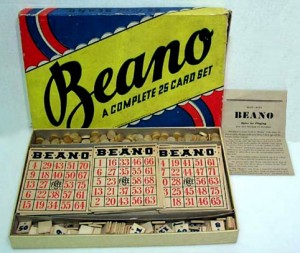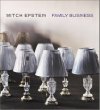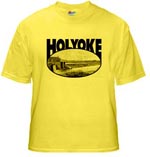by Laurel | February 25th, 2014
25 February 1943
Game Defended Against Attacks That It Has Become Racket In Some Cities.
Boston. — Bills to investigate, abolish and also to extend licensed gambling in Massachusetts were stoutly defended and attacked in heated argument before the Legislature’s Legal Affairs Committee.
The proposals to restrict present legalized gambling consisted of a batch of bills to investigate, regulate and abolish beano. Measures to extend the state’s present partnership in horse and dog racing consisted of two measured to license bookmakers and another a recommendation of a special state commission to open branch offices of the State Racing Commission where bets could be made on races at licensed Massachusetts tracks.
Beano defenders at the hearing consisted entirely of Chicopee and Holyoke legislators who urged continuance of beano as conducted by two churches in the two cities and by the Knights of Columbus and a textile workers union in Holyoke.Beano in Springfield came in for attack when Rep. Perlie D. Chase (R) of Boston, author of one of the bills to abolish beano, declared:
“The game of beano was originally legalized to raise money for charities but instead has become a racket in the control of a group of men who have made millions of dollars out of it. We all know what happened in Malden, and we all know what is going on in Revere and Chelsea. It is common gossip what sort of games are being operated in Worcester and Springfield.”
The beano game conducted by Immaculate Conception Church in Holyoke attracts 3200 to 4000 participants at the weekly game on Fridays, the committee was told. Beano has been the “salvation” of the church, said Rep. Laurence W. Law of Holyoke. Holyoke should not be denied the right to license beano games if city officials wish to do so, Law said, praising the “well-run” manner in which the games are conducted.
“People get a good shake for their money” at the Holyoke games, Rep. Law asserted.
He explained that the Holyoke church had a mortgage of “more than $400,000” when the depression rendered many parishioners unable to pay their pledges toward the cost of the new church building.
Mortgage Reduced
The mortgage has been reduced “substantially” with the help of beano profits, he said. Law intimated the Holyoke church does not intend to conduct a beano game permanently but will drop it when the church “gets on its feet.”
If the church had been forced to drop its school during the depression, the taxpayers would have had to pay $25,000 a year to provide public education for the parochial school pupils, Law said. The beano game has thus saved taxpayers $75,000 annually, he argued.
Rep Edward Lysek of Chicopee declared repeal of the beano law would “unjustly hurt” bona fide charities which are conducting beano games legitimately and in a businesslike manner in Chicopee and Holyoke.
Rep John J. Falvey of Holyoke opposed repeal of beano but declared, “We would welcome an investigation. Our skirts are clean.”
The heavy attack on beano came principally from Somerville. Numerous religious and civic leaders and legislators from that city joined in a demand that the bean law be repealed. Beano in Somerville is a “racket,” the committee was told, run by “three men” who can “walk into the mayor’s office without knocking.”
Beano games take $20,000 nightly in Somerville, declared Rep. Foster of that city. One of the repeal measures was filed by Rep Paul A. McCarthy of Somerville.
The Somerville Knights of Columbus made $80,000 on its beano game in seven months and gave $50,000 of it to charity, Rep. Foster said.
Adapted from the Berkshire Eagle.









